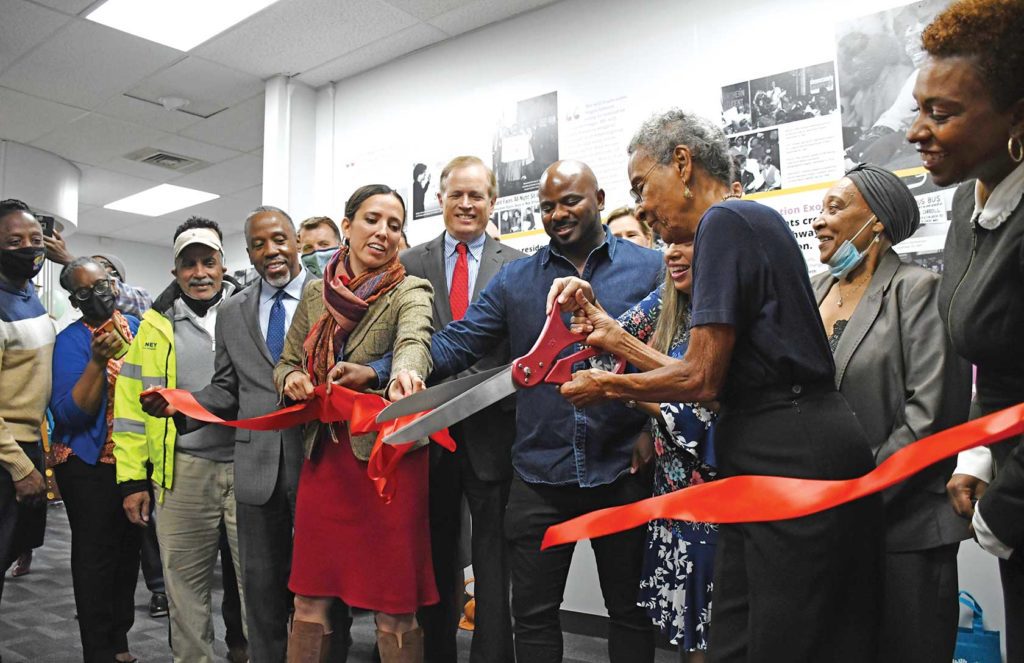
Local education organizers and elected officials gathered Tuesday for the opening of the new headquarters of METCO in Nubian Square and to celebrate a 55-year-long legacy of working to improve diversity and educational opportunities.
METCO, or the Metropolitan Council for Educational Opportunity, is a voluntary desegregation program that enrolls students from communities of color in Boston and Springfield in suburban schools. The participating suburban districts cover the costs of transportation and per-pupil expenditures, while METCO administers the program.
The organization, which had long been located on Dimock Street in Roxbury, opted to move to Nubian Square to better expand their capacities and share their story, said Milly Arbaje-Thomas, the group’s president and CEO.
“One of the first tasks given to me in this leadership role was to find a new home, to move us into the community, to make sure that we have a place that’s actually accessible and actually told our story,” said Arbaje-Thomas at a ribbon-cutting event Tuesday. “For me, this is beyond a dream come true.”
The new headquarters holds conference rooms, meeting space and a computer lab for Boston families and suburban partners to learn and socialize. The space also features an exhibit detailing the organization’s history, drawing on research completed by METCO student interns.
Arbaje-Thomas said the inclusion of METCO’s story is important to remind visitors that there is more work to do.
“This is not a standing place that’s going to remain in hiding,” Arbaje-Thomas said. “We’re going to tell this story and tell this story and tell this story until we do better.”
Patrick Kimble, chair of METCO’s board of directors, helped lead the charge in getting the new space. He said they needed a headquarters where students could feel safe and nurtured so they could best focus on their education.
“It’s very similar to how you can go home and be comfortable at night; we needed a place of comfort for our students,” Kimble said.
Speakers at the ribbon-cutting described a long legacy of METCO’s hard work in diversifying and improving the educational experiences of students in Boston, starting in the 1960s, when the group began working with suburban school districts to offer Black students from Boston’s segregated public schools better educational opportunities.
Massachusetts state Sen. Sonia Chang-Diaz, who represents the 2nd Suffolk District and is co-chair of the METCO Legislative Caucus, said people across the state recognize the success of METCO’s programs.
“They know that they want, something better for their commonwealth, and they are raising their hands and saying, ‘I want to be a part of that,’” Chang-Diaz said. “So, we’re going to keep growing this program for the next 55 [years] and the next 55.”
For James Peyser, state secretary of education, METCO’s program represents an important piece in a broader network of educational opportunities for students in Boston.
“In a large urban community, the diversity of needs and expectations and other challenges means you have to have a variety of options for parents to choose from, and this is a critical one, and one that makes METCO an essential part to the public-school ecosystem here in Boston,” Peyser said.
Arbaje-Thomas said the work METCO does in pushing greater diversity is important to keep anyone, regardless of race, from learning in isolation.
“I’ve heard people say a little bit of diversity doesn’t make a difference, but they’re wrong. They’re wrong because one person can make a difference,” Arbaje-Thomas said.
Chang-Diaz echoed the sentiment, saying that a little bit of diversity creates more and more.
“That little bit of diversity is going to create more diversity, and more diversity, and more diversity in turn at the tables of power throughout our commonwealth and throughout our country,” Chang-Diaz said.
Jean McGuire, who led the organization for the bulk of its existence from 1973 to 2016, said the program is about “we, not me.” She said that efforts like at METCO are an important piece of making sure everybody gets the education they deserve.
“You don’t know, when you get on the subway, who’s going to sit beside you; you don’t know who your children are going to marry; you don’t know who’s going to be your grandbabies; you don’t know who’s going to live next to you,” McGuire said. “You don’t know who’s going to drive your bus or fly your plane or cut open your stomach or fix your knees, like mine, so it behooves you to make certain that everybody gets a good education.”







